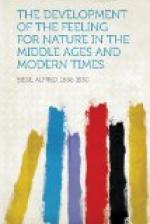Winter, still I see
Many charms in thee,
Love thy chilly greeting,
Snow-storms fiercely beating,
And the dear delights
Of the long, long nights.
Hoeltz was the most sentimental of this group; Joh. Heinrich Voss was more robust and cheerful. He put his strength into his longer poems; the lyrics contain a great deal of nonsense. An extract from Luise will shew his idyllic taste:
Wandering thus through blue fields of flax and acres of barley, both paused on the hill-top, which commands such a view of the whole lake, crisped with the soft breath of the zephyr and sparkling in sunshine; fair were the forests of white barked birch beyond, and the fir-trees, lovely the village at the foot half hid by the wood. Lovely Luise had welcomed her parents and shewn them a green mound under an old beech tree, where the prospect was very inviting. ‘There we propose,’ said she, to unpack and to spread the breakfast. Then we’ll adjourn to the boat and be rowed for a time on the water,’ etc.
We find the same taste, often expressed in a very original way, in both the brothers Stolberg. In Christian Stolberg’s Elegy to Hangwitz, for instance, another poem has these lines:
Thither, where ’mong the trees of
life,
Where in celestial bowers
Under your fig-tree, bowed with fruit
And warranting repose,
Under your pine, inviting shady joy,
Unchanging blooms
Eternal Spring!
Friedrich Stolberg was a very prophet of Nature; in his ode Nature he says:
He who does not love Nature cannot be my friend.
His prayer may serve as the motto of his day:
Holy Nature, heavenly fair,
Lead me with thy parent care;
In thy footsteps let me tread
As a willing child is led.
When with care and grief opprest,
Soft I sink me on thy breast;
On thy peaceful bosom laid,
Grief shall cease, nor care invade.
O congenial power divine,
All my votive soul is thine.
Lead me with thy parent care,
Holy Nature, heavenly fair!
He, too, sang the moon; but Klopstock’s influence seems to have carried him to higher flights than his contemporaries. He wrote in fine language of wild scenery, even sea and mountains, which had played no part in German poetry before.
TO THE SEA
Thou boundless, shining, glorious sea,
With ecstasy I gaze on thee;
Joy, joy to him whose early beam
Kisses thy lip, bright ocean stream.
Thanks for the thousand hours, old sea,
Of sweet communion held with thee;
Oft as I gazed, thy billowy roll
Woke the deep feelings of my soul.
There are beautiful notes, reminding one of Goethe, in his Unsterbliche Juengling, Ode to a Mountain Torrent.




